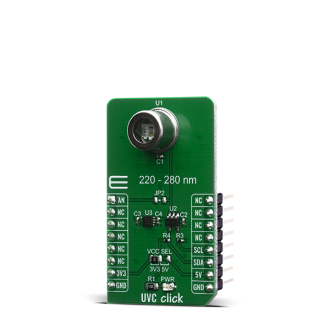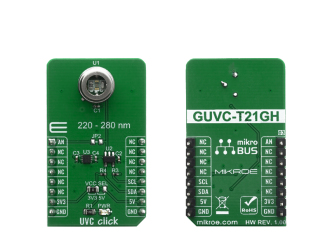
We strongly encourage users to use Package manager for sharing their code on Libstock website, because it boosts your efficiency and leaves the end user with no room for error. [more info]

Rating:
Author: MIKROE
Last Updated: 2020-06-19
Package Version: 1.0.0.0
mikroSDK Library: 1.0.0.0
Category: Measurement
Downloaded: 3570 times
Not followed.
License: MIT license
UVC Click is an ultraviolet sensing board based on GUVC-T21GH ultraviolet sensor from GenUV, capable of measuring UVC spectrum in the range of 220nm up to 280nm and light intensity from 0mW/cm² up to 9.3mW/cm².
Do you want to subscribe in order to receive notifications regarding "UVC click" changes.
Do you want to unsubscribe in order to stop receiving notifications regarding "UVC click" changes.
Do you want to report abuse regarding "UVC click".


Library Description
The library contains basic functions for working with the UVC click.
Key functions:
uint16_t uvc_read_raw_data( ) - Read 12bit raw datafloat uvc_get_voltage( ) - Calculate voltagefloat uvc_calculate_power( float voltage ) - Calculate powerExamples description
The application is composed of three sections :
void application_task ( )
{
uint16_t raw_data;
float voltage;
float power;
char demo_text[ 20 ];
raw_data = uvc_read_raw_data();
IntToStr( raw_data, demo_text );
mikrobus_logWrite( "Raw data: ", _LOG_TEXT );
mikrobus_logWrite( demo_text, _LOG_LINE );
voltage = uvc_get_voltage();
FloatToStr( voltage, demo_text );
mikrobus_logWrite( "Voltage: ", _LOG_TEXT );
mikrobus_logWrite( demo_text, _LOG_TEXT );
mikrobus_logWrite( " mV", _LOG_LINE );
power = uvc_calculate_power( voltage );
FloatToStr( power, demo_text );
mikrobus_logWrite( "Power: ", _LOG_TEXT );
mikrobus_logWrite( demo_text, _LOG_TEXT );
mikrobus_logWrite( " mW/cm2", _LOG_LINE );
mikrobus_logWrite( "----------------------", _LOG_LINE );
Delay_ms( 1500 );
}
Other mikroE Libraries used in the example:
Additional notes and informations
Depending on the development board you are using, you may need USB UART click, USB UART 2 click or RS232 click to connect to your PC, for development systems with no UART to USB interface available on the board. The terminal available in all MikroElektronika compilers, or any other terminal application of your choice, can be used to read the message.